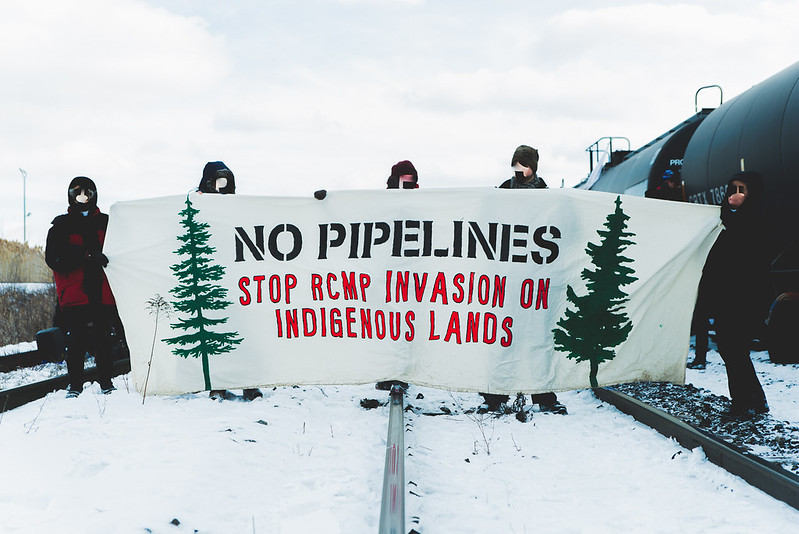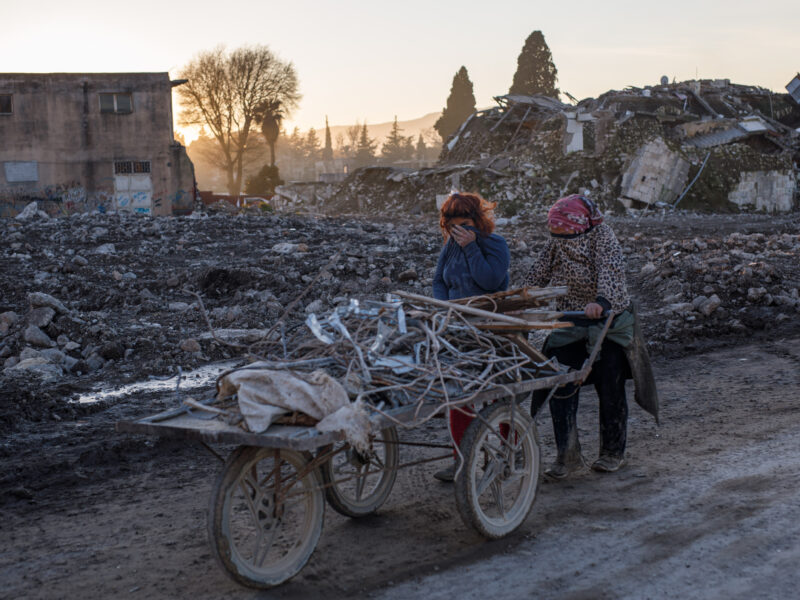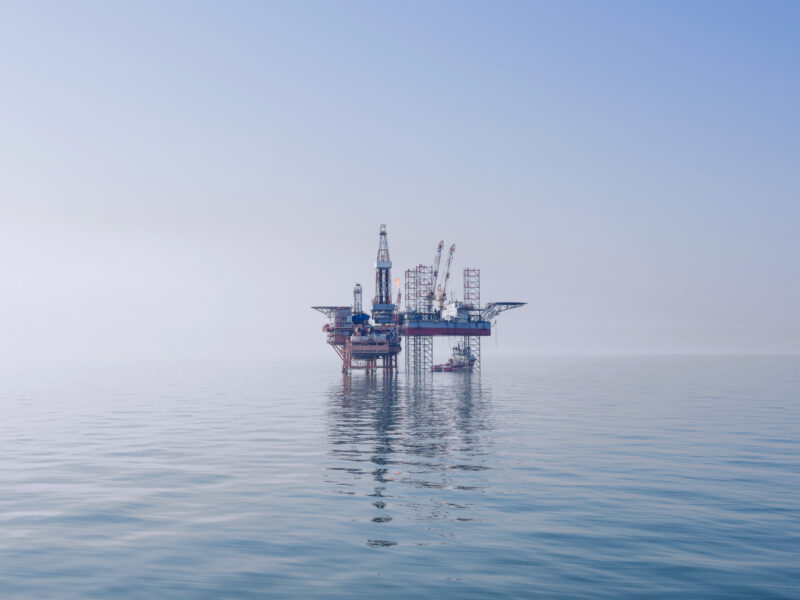A band of First Nations people have won national and international support for their refusal to allow a pipeline through their land.
Until cross-country rail blockades by Indigenous activists and their allies made front-page news earlier this month, few Canadians noticed the protests against a pipeline in We’tsuewet’en territory. Opposition to the project from First Nations people in northwestern British Columbia has, however, been consistent—and years in the making. The dam that had been holding back a slow and steady bubbling of resistance burst late last month when heavily armed militarized police moved to enforce a court injunction and tear down a blockade against Coastal GasLink, the company that wants to run its 670-kilometre gas pipeline through unceded native land.
Hereditary chiefs of We’tsuewet’en territory maintain they have jurisdiction over this unceded land and that both Coastal GasLink/TC Energy and the government are in violation of a Supreme Court ruling. Complicating matters: under the Indigenous system of governance, hereditary chiefs from each clan are title holders of the land; meanwhile the band councils (created through the government-imposed Indian Act) have control over the land that the government allotted to reserves. The issue of who controls the land has never been settled legally, nor resolved by negotiation or litigation.
This is not the first time a confrontation between Canadian authorities and Indigenous people has made international news. In 1990, Mohawk people in Quebec held off for 78 days against a golf club developer who wanted to construct condos on traditional burial grounds. The confrontation led to the Oka Crisis, with the provincial and federal governments, in a rare show of unanimity, working together to deploy the military against the barricaded Mohawk. Like the current We’tsuwet’en standoff, it sparked a global solidarity movement in support of Indigenous communities fighting a centuries-old battle against colonialism.
This, however, is the first time Indigenous protests over land rights has garnered popular support among non-Indigenous Canadians.
- The Idle No More protest movement, founded in 2012 to honour Indigenous sovereignty and protect the water and land, sensitized non-Indigenous Canadians to the grievances and concerns of Indigenous communities.
- The National Inquiry into Missing and Murdered Indigenous Women and Girls demonstrated the direct connection between the violation of Indigenous rights and Canada’s staggering rates of violence against women and girls of the First Nations.
- The Truth and Reconciliation Commission of Canada opened the nation’s eyes to the horrific and lasting impacts of the residential school system on Indigenous students and their families.
Add to all of the above a rising global awareness about the effect of climate change and the need to move away from fossil fuels to cleaner energy systems and it’s easy to see why popular support for the protests has grown—despite the economic cost of forcing the railway to shut down.
We’tsuwet’en advocates and hereditary leaders have been warning for years about the possibility of a showdown. Critics of the train blockades, however, are now saying that few Indigenous groups are involved in the protests. They point the finger instead at white eco lobbyists, allegedly funded by foreign groups with nefarious intentions. John Ivison, a columnist for the right-wing National Post, went so far as to claim “millennial eco-activists are the new colonialists.” This is a bold take, given that land protectors have for decades been defending the environment from corporations intent on ramming pipelines through unceded land.
Activists for Indigenous rights and for environmental protection rights have allies in Canada and around the world because they are intrinsically connected through shared goals. Shale gas development, pipelines transporting oil, the polluting effects of extraction for a country’s biodiversity, water and land, are issues that are not limited to Indigenous communities. Nor is opposition to pipelines uniquely Canadian: TC Energy has faced major opposition in Mexico and the United States. As long as the industrialized world refuses to transition to renewable sources, they will continue to expropriate Indigenous land and exploit the natural world for fuel.
This is why Indigenous activists around the world —Mexico, Honduras, Brazil, the Philippines, Colombia — are fighting against mining, logging, and other exploitation of community lands, often at the cost of their own lives.
The UN has warned of a “drastic increase” in violence against Indigenous people because of their resistance. According to UN Special Rapporteur on the Rights of Indigenous Peoples, Victoria Tauli-Corpuz, “67 percent of the 312 human rights defenders murdered in 2017 were defending their lands, the environment, or Indigenous rights, nearly always in the context of private sector projects.”
But there are success stories, too. Just last week, the Indigenous community in Oaxaca, Mexico, won a ruling against a Canadian-owning mining company operating in the town. The company had obtained permits to exploit local mineral and precious metal deposits without first consulting the community and, as a result, the environmental protection agency ordered the mine closed.
Political activism raises awareness, which in turn inspires conversations, and helps public sentiment turn in favour of the marginalized— and this is when the vilification begins. Smear campaigns and hate speech painting Indigenous people as obstacles to economic development, lawless “thugs” and “paid protesters” have already commenced, with some of these comments coming directly from the House of Commons in Ottawa.
Outgoing Conservative leader Andrew Scheer, who has repeatedly referred to the democratic protests as illegal, instructed Indigenous protesters—many of whom still live with boil-water advisories in communities that lack basic amenities—to “check their privilege.”
Scheer recently stood up in the House of Commons to demand the protestors be removed by police force if necessary. Peter MacKay, the man currently vying for Scheer’s job, chimed in by posting a video declaring Indigenous protesters and their supporters “a small gang of professional protesters” and “thugs” holding “innocent Canadians hostage.”
The Post Millennial, a pro-Conservative media platform, blamed CN Rail’s recent layoffs on Indigenous activists— ignoring both the fact that the company had announced upcoming layoffs in late 2019 and that unions and workers have expressed solidarity for We’tsuwet’en protests.
“Rail blockades could see cities run out of chlorine for water treatment,” read another headline. But the article itself attributes the claim to a lobbyist for chemical distribution companies. Most cities in fact have their chlorine trucked in; and The Post Millennial did not mention that 60 Indigenous communities have been living with boil-water advisories for decades.
In Canada, as in many other countries with significant Indigenous populations, the policy for decades has been to deny or ignore their legitimate rights and titles. Now, once again, a private company wants to invade unceded territory and exploit its land for economic gain at the expense of the people who live on it. Because those people have little legal or economic power, they are engaging in peaceful civil disobedience as a means to be heard. But instead of listening, the authorities are treating them like criminals.
Faced with escalating pressure from the blockades and the people outraged by them, Prime Minister Justin Trudeau cancelled a trip to Barbados, where he was expected to pitch Caribbean leaders on why Canada should be granted a seat on the United Nations Security Council. Instead, he held an emergency meeting of cabinet ministers Monday in Ottawa. To his credit, he denounced the calls for force, making it clear that a solution could only be found through discussions. Indigenous Services Minister Marc Miller reiterated that sentiment, stating that “the pathway to de-escalation is a painful one, and it’s an hour-by-hour conversation that involves engagement at the highest levels.” Violence and suppression are easy and respectful dialogue is tedious and long, but it’s the latter that is required now.
Canada has yet to engage fully with its grim colonial legacy. This is a country founded on the often-violent seizure of Indigenous land; the displacement of communities via state-sponsored residential schools; and the banning and hoped-for extinction of Indigenous culture, languages, and culture. This legacy is responsible for countless deaths and for generational trauma that manifests in high rates of suicide, incarceration, and substance abuse; it has also played an instrumental role in settler privilege and prosperity.
Canada can no longer afford to prop up polluting industries that threaten our biodiversity and the viability of our land and water. It’s unconscionable to do so. Indigenous concerns should be our concerns also. They are one and the same.
The discourse and increasing support around the We’tsuewet’en protests and train blockades is evolving rapidly because public awareness is rising. Canadian attitudes toward environmental issues are evolving. We’re now starting to realize as a global community that Indigenous people are leading the way in a battle we must wage together.



